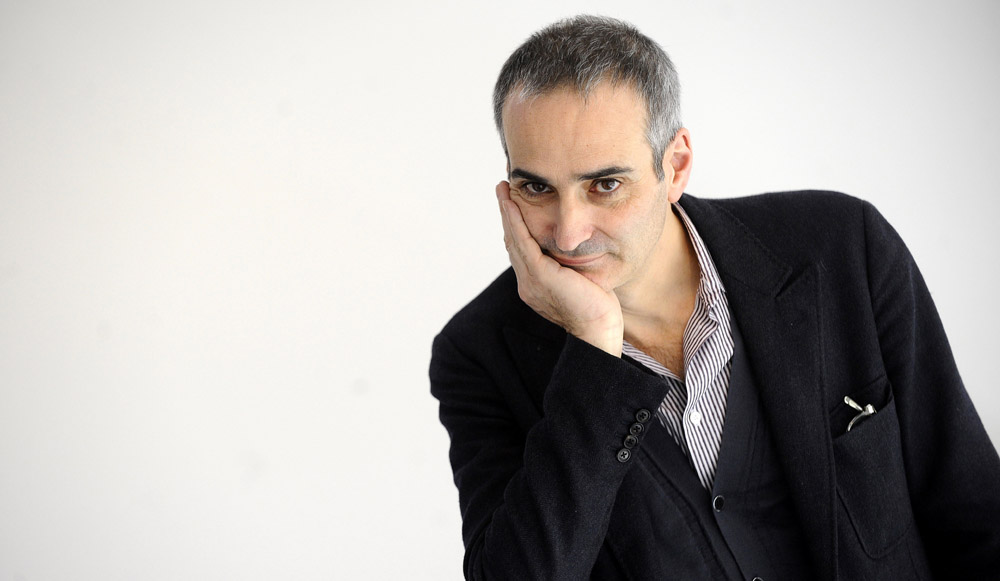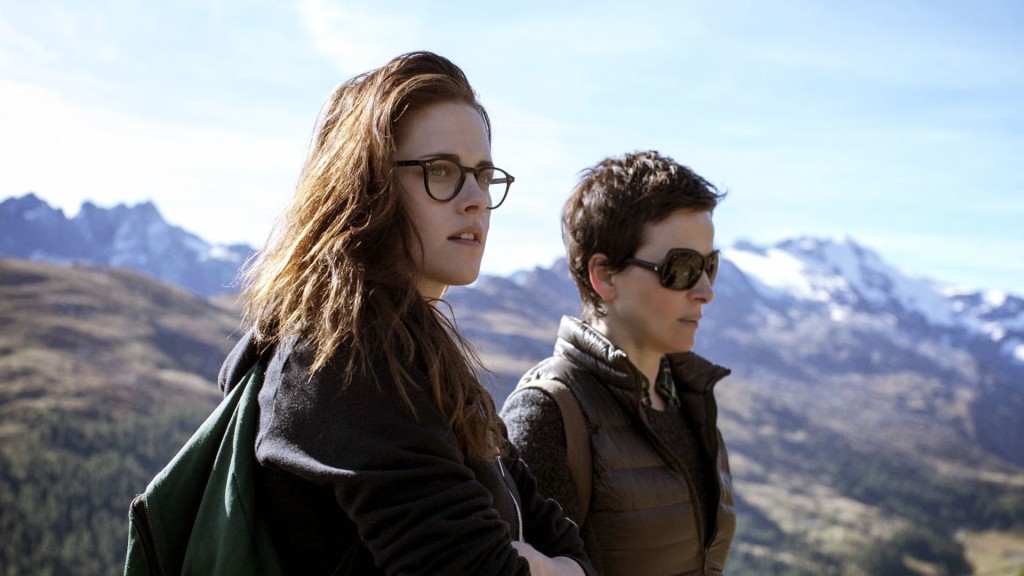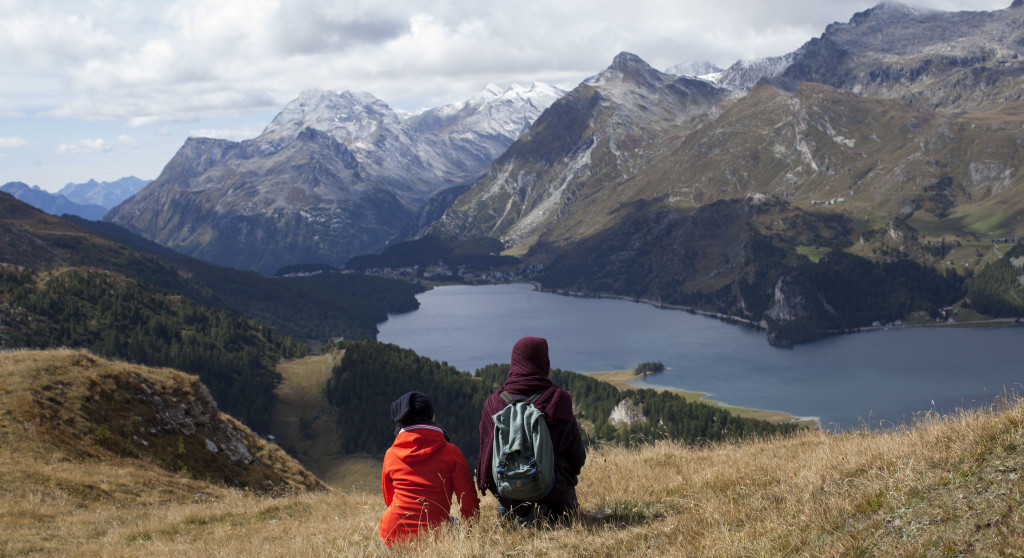Reviews include Irena’s Vow, The Beast, and Before I Change My Mind.
Staging Ambiguity: A Conversation with Olivier Assayas
April 9, 2015
By José Teodoro

Olivier Assayas began as a painter. He was heavily influenced by the writings of Guy Debord. His youthful struggles to reconcile his artistic ambitions with the dictates of his radical leftist politics are detailed in his memoir A Post-May Adolescence: Letter to Alice Debord. He ghostwrote television episodes for his father. He was a very good critic for the formidable Cahiers du cinéma. The soundtracks to the films he would later helm, not to mention the graphics that emblazon his T-shirts, betray a ferocious lifelong interest in music, most especially, though far from exclusively, in rock ‘n’ roll. His breakthrough as a filmmaker arrived when he co-wrote a feature for director André Téchiné.
I offer this compressed curriculum vitae in part to remember that a body of work as rich and satisfying as Assayas’—15 very different features in less than 30 years—is rarely the result of some single-minded, hardliner’s quest. Assayas doesn’t make movies like a painter or a critic or a situationist ideologue. Nor does he make movies like some factotum who tenaciously wedged his way into the industry. Highly engaged with form and narrative structure while seldom being ostentatiously innovative about it, Assayas’ films exude a mixture of classical storytelling craft, restless invention, and lived experience. His sensibility is always becoming. His relationship to tradition, including the tradition of the avant-garde, is always under negotiation. He’s as aware as anyone of his cinematic forebears, yet his films, personal in the best and broadest sense of the word, are not slaves to influence or historical continuity.
Some of those films: Cold Water (1994), Irma Vep (1996), Demonlover (2002), Clean (2004), Carlos (2010), Something in the Air (2012). His latest film, Clouds of Sils Maria, which opens in Toronto this week, is one of Assayas’ international titles, with a cast that includes Kristin Stewart, Chloë Moretz and Juliette Binoche, with whom Assayas worked on Summer Hours (2008) and for whom this new project was written. Binoche plays an actress who, along with her personal assistant (Stewart), retires to the alpine cottage of an old playwright friend who has recently suicided—the same playwright who authored the very play that made her career. When she first performed that play, which is essentially a two-hander, she was the ingénue. 30 years later, she’s now preparing to play the opposite role, that of the older woman, while the ingénue is being taken on by a bad girl American celebrity (Moretz).
The following conversation transpired over a parade of unsolicited confections in a hotel restaurant during the 2014 Toronto International Film Festival. We spoke generally, of theatre and film, of Ingmar Bergman, and of Binoche and acting, but, be warned, we also discuss a major twist in Clouds’ plot.
Do you feel like you cast actors from the U.S., or from Hollywood, rather, differently than you do actors from France?
In a sense. I’ve been excited about getting beyond the borders of French cinema. I have not been functioning within the system of the French industry.
How so?
I mean, for example, working with actors who attract big box office. In France I’ve always worked with people I love. Stage actors, respected actors, but not big box office draws. But in any case I don’t write farce or the kinds of films that are considered to be functioning within that system. I make these smaller French films or I make these big international films. So there’s a whole category of actors who I wind up never connecting with. Even if I admire them. You know, Romain Duris is brilliant. I’ve just never had the opportunity to work with him.
You mentioned the stage. Do you ever work in the theatre?
No. I never did.
Does the theatre interest you? Is that an entry point for Clouds of Sils Maria?
It’s not the best entry point. It’s more of a decoy. Yes, it’s about an actress rehearsing for a play. Why is she rehearsing for a play rather than for a film? Because I think you rehearse differently when you’re rehearsing for a play. Because it’s all about the writing, the dialogue. Whereas with cinema, you can work on your lines but you’re never dealing with the whole complex thing. When you’re rehearsing a play you can stage it, imagine it. But what’s going on in this film is not so much about the techniques of acting. The beauty of acting is that you are forced to deal with emotions that are not necessarily yours, or areas within yourself that you haven’t necessarily explored before. You have to live something of yourself through that character, to grasp it. So to me it’s more about how a person has to find a path to understand the emotions of another person. Or to find within one’s self something that is universal, that can be shared.

In Clouds of Sils Maria I was especially drawn to the scenes in which it’s initially ambiguous as to whether Maria and Val, who we mostly see in this isolated place, with no one else around, are running lines or working something out between them. Every good movie about acting is a movie about trying to find a way to be in the world.
Yes, absolutely. And those scenes can be about both things.
I wanted to know about your theatre experience because Clouds conveys an understanding of what it means to work as an actor in the theatre. Though I suppose you did have to direct some theatre, at least a little, since the film ends with glimpses of a staged production.
Yes, I had to stage the play. Or some of it. I love theatre, but I don’t have the patience for it. Because of the transience of the medium. I love movies because they stay. My problem with the stage is that it vanishes. You do it, it’s around for a while, and then it’s gone. I can’t deal with that. It’s like writing on water or something.
The only enduring glory is for the playwright.
Exactly. What would interest me more with regards to making theatre would be to write a play. And I would be extremely furious with how it’s staged.
I’m sure you could do that. I mean, many of your films convey a facility for writing for the stage. You write geographically contained scenes, with arcs and escalations of drama that can be mapped out within the dialogue.
It’s a form of writing that can be an inspiration. A lot of filmmakers I admire have been playwrights. Bergman, Fassbinder. Great playwrights.
There are many layers of connective tissue between Clouds and Bergman’s Persona. Was that something you became aware of early in the writing process, something you needed to negotiate with yourself?
Oh yes. I did not want to go there, but I could not escape going there. The moment I decided to make a movie about Juliette Binoche as an actress rehearsing a play, in this kind of rarified environment, I was already tiptoeing into Persona territory. I didn’t watch the film again. I have memories of it. What I was trying to do was not go there too much. But what can I do? I cannot escape the fact that it’s one of my favourite movies of all time. It’s not something you forget about or get ride of. It’s a ghost and it’s floating around.
And yet, despite its being revered, I feel like Persona is not so frequently referenced or repurposed in other films. Perhaps because of this connection to theatre, something most filmmakers jut don’t have.
I think the reason that Persona is so often cited as one of the great movies of all time is because it’s archetypal. Every once in a while you have a movie that’s never been made before, yet somehow was missing from film history. A film like Persona is archetypal and thus can be remade a thousand times and every filmmaker and every time turned into something completely different.
And of course we do have some a couple of fairly conspicuous homages, 3 Women and Mulholland Dr. They make quite direct references to Persona within entirely different settings. You’ve done something else. I should jump back and just ask the more pedestrian question: what was the first impulse behind Clouds? The landscape? Juliette Binoche?
Juliette. It was the shared desire to make a film together. And the minute I started thinking about it I knew that I would not be writing a part for Juliette Binoche. I would be using Juliette Binoche as the material, as the starting point. I wanted her to play someone who looked very much like herself and, at the same time, is different. I knew she could have fun with that. She has fun understanding everything from the inside, with being able to use her own experience, with being able to draw upon her own resources to bring humour to the scenes, and with the differences. She’s being herself, but she’s also being another actor that she could have been. She can play with feelings that she has repressed. She walks a very think line between a fictional character and a real-life situation.
How did she feel when she saw your script?
She was surprised. I hadn’t told her a thing. While I worked on the screenplay we would meet once in a while and she would ask me, “What exactly is this about?” I would just tell her that it takes place in Switzerland, or something like that. I didn’t want to discuss it. Partially because things at that point weren’t stabilizing and I didn’t want to say anything that could be misleading. You know, I tend to start by going in one direction, then drop it, then go back two steps. Anyway, I think when she saw the script she instantly understood it as something really exciting. I think she was mostly scared by the fact that there was a lot of dialogue in English.
Really?
She really wants to sound as perfect as possible in English. I kept on telling her, “Juliette, it doesn’t matter, because you’re playing a French actress with an international career. If you sound French here and there it’s not an issue. It’s part of the film.” But she prepared for weeks and weeks. She would call me up when I hadn’t even begun preparing myself and ask me about this one scene, if she change this or that word. I told her she could do whatever she wanted. Change the whole line.
Can you articulate what it is about Binoche that prompted this story?
I think it’s our common history. The film that made her famous overnight in France, Rendez-vous, was also my first produced screenplay. Well, it’s not my screenplay—I co-wrote it with André Téchiné, the director—but it was the first time I got some recognition for my writing. It opened the door for me to make my first feature the next year. So we share this starting point. And it’s not just any starting point. It’s a film about theatre. It’s a film about a very young woman becoming an actress. So when I started writing Clouds I was inspired by the fact that time had passed and we were able to reminisce about this starting point. There was something stimulating about dealing with similar themes, but from a completely different perspective. Integrating the perspective of time—including the vertigo of time.

There is that powerful sense of finding yourself on the other side of the mirror. Which in Maria’s case means literally taking the reverse role of the one she originally played. I wonder if, like Bergman, you have some stakes in your female character’s situation. She’s a woman, she’s an actress, but do you relate to her struggle to some degree?
I think it’s very different when you’re a man. I mean, everyone is confronted by the passing of time, by what to do with experience, with the maturity that time gives you. Once in a while we all have to open a new chapter. So yes, we have this in common, but I don’t think it’s as cruel or as tough for a writer as it is for an actress. When you’re a writer, it’s about keeping in touch with the world. And when you make movies you’re extremely privileged in that sense. You’re aware of how the world is changing. You don’t really lose touch with that. When you’re an actress time also means physical change, in the sense that your face is being scrutinized by the camera and then blown-up on a giant screen and all of a sudden every tiny wrinkle becomes a big deal. It’s challenging. If you’re making a movie about how time passes the results are going to be more extreme if you’re dealing with an actress.
That scrutiny is really emphasized in the transition between parts one and two, no? Because in the first part she’s very glamorous, ridiculously beautiful—I mean, honestly, she’s always beautiful—but then in the second part you’ve scrubbed her clean and cut her hair short.
That was Juliette’s choice. She came up with it.
And was she okay with showing her body?
Absolutely. All that stuff comes from her. When she strips naked, that wasn’t something I ever asked her to do. The camera was rolling and all of a sudden she just stripped naked and got into the water. She was extremely generous and brave. She exposed herself in a way I found very gutsy. Funnily enough, afterwards she would see the film and say, “Oh my god, I didn’t realize I was doing that.” [Laughs] I think she’s very proud of the film, very happy with it, but still, I think it was only after that she started to really consider all this. When we were shooting she wasn’t wasting time thinking about these things. She just did them.
For all the vulnerability involved, that stripping by the lake is also a really brilliant power move on the character’s part, no? Val isn’t naked, but Maria is. It’s a way of asserting her sexuality and her presence.
Yes, she understood that very well.
It makes me think too that there’s something fishy about Maria’s resistance to accepting the role. By which I mean that she would only be ambivalent so long as Val was there to keep saying, “No, no, you should do it.”
Yes, of course, she constantly wants to be convinced. She needs someone to express her insecurities to. She can only get rid of all her doubts, all her fears, if Val is there. She needs Val to fight back.
And then Val disappears. I have to say I was, for reasons I can’t quite explain, very moved by your choice to elide the entire aftermath of Val’s disappearance. That choice, was it always there?
Yes. For some reason it was always there. I always knew that at that point she disappears. I had no idea where I would go from there. At one point I had no idea if we would actually see the play, but I knew that Val had to disappear.
But to have to her disappear and then not mention it…
Yes, it’s the disappearance of the disappearance. To me it seemed the strongest possible way of keeping her in the movie somehow. Because no one mentions her, you keep thinking she’s going to pop up. In a certain way, everything is seen through the eyes of Val. What would she say if she was there? What would she be doing?
She feels like the film’s protagonist, for sure.
And it echoes beyond the film. We’re talking about it right now and it’s often been the first question that comes up. You can make whatever you want of it. Anyone’s guess is really as good as mine. But in narrative terms it’s the best stage exit I could give her. It’s what really gives the character her scope and mystery. It is, for me, an essential part of that character.
It’s also the disappearance of youth from Maria’s life. And you sense that humbling of her in the third part, when she’s confronted by Jo-Ann’s coldness.
All of a sudden you realize Maria’s vulnerable because Val is not round anymore. And you said it exactly. It’s about loss. Loss of youth.
Before we end, I really want to ask you about Sils Maria, about this cloud formation. Is this place, this phenomenon, something you knew, something you wanted to do something with?
Yes, for a couple of reasons, one being very banal. I’ve been going there on holidays. I like hiking in Switzerland. I also just love those landscapes. I love that area. I’ve always been drawn to it. But the reason why it ended up being such an essential part of the film is because it’s a landscape that’s inhabited by history, which is embodied a little bit by the short black and white film of Arnold Frank. There are ghosts there, ghosts of Nietzsche, Rilke. It’s inhabited by the ghost of modern European history. Some of them are benevolent, some malevolent. So it’s not just a beautiful postcard landscape. It’s a landscape with some ambiguity. There’s some kind of danger lurking, which gives the narrative tension. They call the clouds a snake. There is this notion of evil.
You have one character choose to end his life there, and then you have another character choose to end at least part of her life there. If you could choose a place to die, would that be it?
Mm. That’s not yet part of my everyday consideration. [Laughs]



